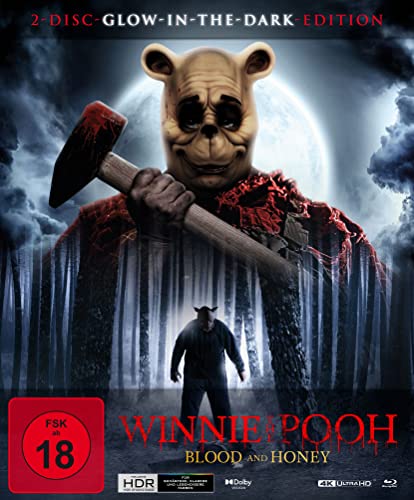![The Atomic Bomb Movie [1999]](/pictures/1004868.jpg) The Atomic Bomb Movie | DVD | (18/01/2000)
from £N/A
| Saving you £N/A (N/A%)
| RRP
The Atomic Bomb Movie | DVD | (18/01/2000)
from £N/A
| Saving you £N/A (N/A%)
| RRP Trinity And Beyond - Atomic Bomb Movie
![Stalker [1979]](/pictures/1006107.jpg) Stalker | DVD | (22/04/2002)
from £49.90
| Saving you £-25.91 (N/A%)
| RRP
Stalker | DVD | (22/04/2002)
from £49.90
| Saving you £-25.91 (N/A%)
| RRP Andrey Tarkovsky entered school in Moscow in 1945 and nine years later enrolled at the State Institute of Cinematography. He displayed a remarkable talent with his first feature Ivan's Childhood in 1962 and he continued to astound for over twenty years. He announced his self-imposed exile from the USSR in 1984 just two years before his death. His memory has since been venerated in his home country and his reputation and stature continue to grow throughout the world. The 'Stal
![Ivan's Childhood [1962]](/pictures/1006044.jpg) Ivan's Childhood | DVD | (26/08/2002)
from £N/A
| Saving you £N/A (N/A%)
| RRP
Ivan's Childhood | DVD | (26/08/2002)
from £N/A
| Saving you £N/A (N/A%)
| RRP Andrei Tarkovsky's prize-winning debut feature is an extraordinaryly moving and powerful story of war and revenge. Determined to avenge his family's death at the hands of the Nazis 12 year old Ivan joins a Russian partisan regiment as a scout where he becomes indispensable for his ability to slip unnoticed through enemy lines. But as his missions become increasingly dangerous it is decided that he must be removed from the front line. Ivan resists and convinces his commanding offic
 Rossini - The Barber Of Seville | DVD | (02/01/2007)
from £29.93
| Saving you £-4.94 (N/A%)
| RRP
Rossini - The Barber Of Seville | DVD | (02/01/2007)
from £29.93
| Saving you £-4.94 (N/A%)
| RRP Rossini: Il Barbiere Di Siviglia
 The Stone Flower - Prokofiev | DVD | (03/10/2005)
from £4.98
| Saving you £11.77 (365.53%)
| RRP
The Stone Flower - Prokofiev | DVD | (03/10/2005)
from £4.98
| Saving you £11.77 (365.53%)
| RRP First performed at the Bolshoi Theatre in Moscow in 1954 this ballet draws on the rich heritage of Russian folklore to tell the tale of the young stonemason Danila who must choose between his village sweetheart Katerina and a magical temptress. It is based on fairy tales from the Urals collected by Pavel Bazhov and set in the middle of the 19th century.In Stone Flower you can feel Prokofiev's resignation after the hard struggle with the political situation but nevertheless he hasn't lost his brilliance and the music of his last ballet still is full of catchy tunes and joyousness.However with the completion of his composition it took four years before it received its premiere in Moscow and was not a great success at all. It was only three years later with the choreography of Yuri Grigorovich that Prokofiev's Stone Flower finally come to a glorious resurrection. The young choreographer simplified the story and focussed on nothing but the dance. The ballet became his first major success. The presented version shows a reproduction of this choreography from 1957 which has become immortal.
![Dovzhenko: War Trilogy [DVD]](/pictures/1116248.jpg) Dovzhenko: War Trilogy | DVD | (24/09/2012)
from £22.55
| Saving you £22.44 (99.51%)
| RRP
Dovzhenko: War Trilogy | DVD | (24/09/2012)
from £22.55
| Saving you £22.44 (99.51%)
| RRP Titles Comprise:Zvenigora:Arsenal:Earth:
![Ivan the Terrible [DVD]](/pictures/1111482.jpg) Ivan the Terrible | DVD | (21/11/2011)
from £N/A
| Saving you £N/A (N/A%)
| RRP
Ivan the Terrible | DVD | (21/11/2011)
from £N/A
| Saving you £N/A (N/A%)
| RRP Sergei Eisenstein's saga of Czar Ivan IV continues with the struggle for power and the use of secret police, a controversial segment that caused the film to be banned by Stalin in 1946 (but was later released in 1958). The predominantly black-and-white film features a banquet dance sequence in colour. Obviously the two parts must be viewed as a whole to be fully appreciated. Many film historians consider this period in Eisenstein's career less interesting than his silent period because of a sentimental return to archaic forms (characteristic of Soviet society in the 1930s and '40s). Perhaps it was just part of his maturity.
![Earth [DVD] [1930]](/pictures/1102150.jpg) Earth | DVD | (17/05/2010)
from £11.59
| Saving you £6.40 (55.22%)
| RRP
Earth | DVD | (17/05/2010)
from £11.59
| Saving you £6.40 (55.22%)
| RRP Dovzhenko's landmark 'film poem' style brings to life the collective experience of life for the Ukranian workers examining natural cycles through his epic montage. He explores life death violence sex and other issues as they relate to the collective farms. An idealistic vision of the possibilities of communism made just before Stalinism set in and the Kulack class was liquidated Earth was viewed negatively by many soviets because of its portrayal of death and other dark issues that come with revolution.
![The Eisenstein Collection Vol.2 [DVD]](/pictures/1101676.jpg) The Eisenstein Collection Vol.2 | DVD | (20/09/2010)
from £26.19
| Saving you £33.80 (129.06%)
| RRP
The Eisenstein Collection Vol.2 | DVD | (20/09/2010)
from £26.19
| Saving you £33.80 (129.06%)
| RRP Collection Comprises: Bezhin Meadow (1937) Alexander Nevsky (1938) Ivan The Terrible Part 1 (1944) Ivan The Terrible Part 2: The Boyars Plot (1958)
![Mute Witness [1996]](/pictures/1022134.jpg) Mute Witness | DVD | (13/10/2003)
from £N/A
| Saving you £N/A (N/A%)
| RRP
Mute Witness | DVD | (13/10/2003)
from £N/A
| Saving you £N/A (N/A%)
| RRP Three unsuspecting Americans making a low-budget horror film in Russia find themselves in the middle of a dangerous life threatening situation. Billy (Marine Sudina) a mute make-up artist finds herself locked in the film studio late one night. As she tries to get out she witnesses a brutal murder...
![Bridge Of Dragons [1999]](/pictures/1003506.jpg) Bridge Of Dragons | DVD | (15/04/2002)
from £N/A
| Saving you £N/A (N/A%)
| RRP
Bridge Of Dragons | DVD | (15/04/2002)
from £N/A
| Saving you £N/A (N/A%)
| RRP Cross it at your peril. The warrior is the perfect soldier. Adopted by Warlord Ruechang he is a trained killer. What he must become is the perfect warrior. As a soldier he is taught only to obey. But his loyalties are swayed when he meets a young princess fated to marry Ruechang and rule over the oppressed people. When she flees the marriage Ruechang sends the warrior in pursuit. Now the perfect killing machine must find the humanity within that will guide him towards rebellion and justice. His quest for honor will make him a true warrior. But before he takes that path he must first defeat the forces of the man who saved his life and finally face Ruechang in an explosive bloody fight to the finish.
 Winnie the Pooh: Blood and Honey - Steelbook (4K Ultra HD) (+ Blu-ray) | Blu Ray | (13/07/2023)
from £N/A
| Saving you £N/A (N/A%)
| RRP
Winnie the Pooh: Blood and Honey - Steelbook (4K Ultra HD) (+ Blu-ray) | Blu Ray | (13/07/2023)
from £N/A
| Saving you £N/A (N/A%)
| RRP  Parsifal - The Search For The Grail | DVD | (11/01/2004)
from £7.66
| Saving you £13.59 (212.34%)
| RRP
Parsifal - The Search For The Grail | DVD | (11/01/2004)
from £7.66
| Saving you £13.59 (212.34%)
| RRP Parsifal: The Search for the Grail is a documentary that sets Wagner's last opera in its cultural context, tracing the history of the Grail myth back to the Middle Ages, and arguing that any specifically Christian myth goes back no further than that. It acknowledges that Parsifal is Wagner's most problematic opera, as well as one of his greatest, and gives chapter and verse for its role in creating the culturally respectable anti-Semitism that led to the Holocaust, as well as discussing other issues like its profound, though eloquently expressed, misogyny. At the same time, it makes what case is possible for the non-aesthetic defence--all of the above is true, and yet it is also an opera about learning compassion, at once poisonous and healing. Placido Domingo is the narrator, taking us through chats with talking heads that range from theologian Karen Armstrong to members of the Wagner family and film clips that range from Monty Python and Indiana Jones to Ingmar Bergman's The Seventh Seal. He also performs the role in a variety of extracts conducted by Valery Gergiev at the Kirov Opera, reminding us of just how viscerally impressive and lyrically beautiful late Wagner can be. On the DVD: The Search for the Grail is presented in old TV standard 4:3 ration with only PCM stereo sound. It comes equipped with a useful set of chapter headings and with subtitles in English, French, German and Spanish. --Roz Kaveney
 Tchaikovsky: Swan Lake (Fayer) | DVD | (24/09/2007)
from £20.35
| Saving you £-1.36 (-7.20%)
| RRP
Tchaikovsky: Swan Lake (Fayer) | DVD | (24/09/2007)
from £20.35
| Saving you £-1.36 (-7.20%)
| RRP Swan Lake tells the timeless tale of redemption through love. It is probably the best known of all the classical ballets and for the prima ballerina who dances the dual role of Odette and Odile the supreme test of the dancer's craft.Maya Plisetskaya's melting lyricism and superlative technique make her one of the greatest exponents of the dual role since the ballet's first introduction over a century ago. Tchaikovsky's score the first in his triumvirate of great battles is the perfect complement to the imaginative choreography that sets Swan Lake apart from anything that had preceded or followed it. This production filmed live at the Bolshoi Theatre captures a great ballerina in her prime in an eternal classic.
![By the Bluest of Seas [DVD]](/pictures/1118971.jpg) By the Bluest of Seas | DVD | (12/11/2012)
from £6.99
| Saving you £11.00 (157.37%)
| RRP
By the Bluest of Seas | DVD | (12/11/2012)
from £6.99
| Saving you £11.00 (157.37%)
| RRP A storm on the Caspian Sea lands two friends, sailor Yusuf and mechanic Alyosha , on the shores of Soviet Azerbaijan where they arrive at the ‘Lights of Communism’ kolkhoz. They are able to find work at the farm as most of the other workers are fighting a conflict on the Pacific Ocean. One of the administrators of the kolkhoz is the beautiful Masha who they both fall in love with. Their rivalry for her affections affects their work and threatens the community. By the Bluest Of Seas is one of the most lyrical and uplifting films of the Soviet era, eschewing propaganda in favour of a comedy about love and friendship.
![Der Fan [1982]](/pictures/1021778.jpg) Der Fan | DVD | (08/09/2008)
from £N/A
| Saving you £N/A (N/A%)
| RRP
Der Fan | DVD | (08/09/2008)
from £N/A
| Saving you £N/A (N/A%)
| RRP Teenager Simone appears to be like any other fan of a rock band. But soon her fixation on the band's lead singer 'R' takes over her life. Simone walks out of school breaks off with her friends and parents and as if sleepwalking somehow finds herself waiting for her idol as he appears on a TV show. As she sees him for the first time she is speechless unable to even ask for his autograph. He notices her and reaches out to touch her. Simone wants nothing more than to love and be lov
![Mussorgsky - Khovanshchina [2007]](/pictures/1080279.jpg) Mussorgsky - Khovanshchina | DVD | (28/01/2008)
from £21.57
| Saving you £8.42 (39.04%)
| RRP
Mussorgsky - Khovanshchina | DVD | (28/01/2008)
from £21.57
| Saving you £8.42 (39.04%)
| RRP Mussorgsky's loveless and brutal drama of the transformation of Russian society, which led to the rule of Peter the Great within the epic history of Russia, is powerfully modernised through Stein Winge's dramatic and uncompromising production. Performing the version completed by Shostakovich, the outstanding Russian-dominated cast and the orchestra and chorus of the Liceu are led by Michael Boder.
 Bizet-Shchedrin - Carmen Suite Ballet | DVD | (03/01/2005)
from £21.59
| Saving you £1.40 (6.48%)
| RRP
Bizet-Shchedrin - Carmen Suite Ballet | DVD | (03/01/2005)
from £21.59
| Saving you £1.40 (6.48%)
| RRP Carmen was first set as a ballet by the famed Russian choreographer Petipa in 1845. It was based on the Merimee novella and premiered in Madrid some thirty years before Bizet's opera was first heard. Subsequent versions followed in the late 19th and early 20th centuries some using and some discarding Bizet's music. In 1949 Roland Petit created a successful vehicle for himself and his wife Zizi Jeanmaire using the Bizet score.Maya Plisetskaya always dreamed of dancing the role of Carmen and had approached Shostakovich for a score. He demurred out of respect for Bizet's celebrated opera. It was eventually Plisetskaya's husband Rodion Shchedrin who agreed to provide the music after seeing his wife and the choreographer Alberto Alonso working on some choreographic ideas. His Carmen Suite ballet based on Bizet and scored only for strings and percussion instruments was a perfect complement to Alonso's choreography and in its theatricality a showcase for Plisetskaya's considerable dramatic gifts. Shchedrin's Carmen Suite one of the darkest settings of Merimee's tragic story deeply symbolic and overtly sensual premiered at the Bolshoi Ballet on April 20 1967.
![Outskirts [DVD]](/pictures/1118975.jpg) Outskirts | DVD | (12/11/2012)
from £10.39
| Saving you £7.60 (73.15%)
| RRP
Outskirts | DVD | (12/11/2012)
from £10.39
| Saving you £7.60 (73.15%)
| RRP Set on a small village on the Russo-German border, the war poisons the village community; close friendships are destroyed by vindictive nationalism, while a sweet romance between a Russian girl (Yelena Kuzmina, By the Bluest of Seas) and a German POW is greeted with suspicion and disapproval. On the front, soldiers face the absurdity of trench warfare, and at home returning veterans are unable to return to normal life; while intimations of the Russian Revolution makes themselves felt within the village. Made in 1933, Outskirts is one of the most ambitious films from the early sound period, ahead of its time with its camera movements and its use of sound, it is regarded as one of the greatest films of Russian cinema.
![Ballad Of A Soldier (Region 2) [1959]](/pictures/1066304.jpg) Ballad Of A Soldier (Region 2) | DVD | (29/01/2007)
from £11.30
| Saving you £8.69 (43.50%)
| RRP
Ballad Of A Soldier (Region 2) | DVD | (29/01/2007)
from £11.30
| Saving you £8.69 (43.50%)
| RRP Nominated at the 1962 Academy Awards for Best Screenplay this Russian classic won many international film awards on its release most notably a BAFTA Award for Best Film. The perfect companion piece to The Cranes Are Flying the storyline highlights the effects of war on individuals as well as that of a nation being dragged to its knees. In the middle of the Second World War Alyosha (Vladimir Ivashov) is commended for destroying two German tanks. Rather than take a medal he requests a four-day pass to visit his mother. The film is about this journey and the life enhancing encounters therein. Produced in 1959 it would have been understandable if the film became a vehicle for the Cold War propaganda of the time but director Grigory Chukhrai manages to avoid that trap instead painting his characters as flawed human individuals trying to survive the catastrophic upheaval in which they find themselves.

Please wait. Loading...
This site uses cookies.
More details in our privacy policy